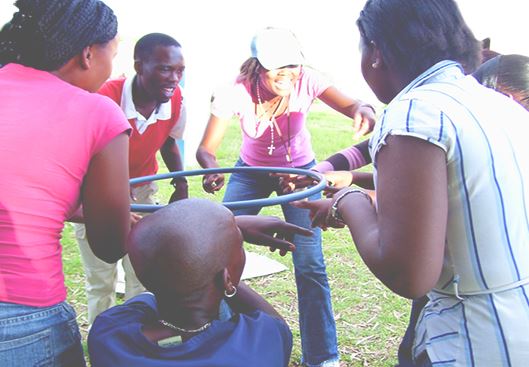Khulisa – investing in people and empowering them
 by
byDenise Nanni and Milena Rampoldi, ProMosaik. Let us move to South Africa to
meet the organisation Khulisa. The basic idea
of Khulisa projects is the following: „Monitoring
and evaluation tools are built into every programme in order to measure the
growth of individuals resultant from the development processes they have
undergone in short, medium and long term.“ We talked to Ann Lesley to
understand which are the main areas of intervention of Khulisa and how Khulisa
empowers „unempowered“ women. Would like to thank Ann for her time and would
like to wish her all success in her actual and future projects.

What
are the main areas of intervention of Khulisa?
are the main areas of intervention of Khulisa?
Khulisa has no main area of intervention as we work
systemically looking at the causal factors of community dysfunctionality.
areas of intervention are multi-fold and based on community needs.
is a description of our organisation.
systemically looking at the causal factors of community dysfunctionality.
areas of intervention are multi-fold and based on community needs.
is a description of our organisation.
Khulisa, a
Non-Profit Organisation (NPO) established in 1997, inspires, empowers and
enables vulnerable children, youth and the community at large to unlock their
full human potential and develop skills towards a sustainable future.
organization operates throughout the country and employs over 380 staff through
30 offices, working in and around 400 communities in collaboration with over
350 NGO partners within South Africa reaching close to 500,000 people per
annum. Khulisa UK was established in 1997.
Non-Profit Organisation (NPO) established in 1997, inspires, empowers and
enables vulnerable children, youth and the community at large to unlock their
full human potential and develop skills towards a sustainable future.
organization operates throughout the country and employs over 380 staff through
30 offices, working in and around 400 communities in collaboration with over
350 NGO partners within South Africa reaching close to 500,000 people per
annum. Khulisa UK was established in 1997.
Khulisa invests in people. Its focus, two decades
ago, was focussed on addressing the void in the Correctional System by
developing innovative, restorative offender rehabilitation and reintegration
programmes. Studies conducted 10 years later
80% of Khulisa Graduates had NOT reoffended as opposed the the 80%
‘norm’ relapse rate. The organisation later evolved into working with
communities at grass root level, using a systemic, collaborative,
multi-stakeholder approach to tackle a range of complex issues which counter
sustainable development. In its current phase Khulisa has shifted the focus
onto empowering “whole communities” working on a shared value basis with
scientific tools the monitor and evaluate, through a cutting edge knowledge
management system, the key contributors lead to demonstrating measurable return
on investment based on social spend.
ago, was focussed on addressing the void in the Correctional System by
developing innovative, restorative offender rehabilitation and reintegration
programmes. Studies conducted 10 years later
80% of Khulisa Graduates had NOT reoffended as opposed the the 80%
‘norm’ relapse rate. The organisation later evolved into working with
communities at grass root level, using a systemic, collaborative,
multi-stakeholder approach to tackle a range of complex issues which counter
sustainable development. In its current phase Khulisa has shifted the focus
onto empowering “whole communities” working on a shared value basis with
scientific tools the monitor and evaluate, through a cutting edge knowledge
management system, the key contributors lead to demonstrating measurable return
on investment based on social spend.
Khulisa
combines the investments and experiences of both the public (Government) and
the private sector – corporations, foundations, nongovernmental organizations
(NGOs, NPOs and SMMEs), universities, local businesses and Diaspora groups –
leveraging their capital and investments, creativity and access to communities
to solve
combines the investments and experiences of both the public (Government) and
the private sector – corporations, foundations, nongovernmental organizations
(NGOs, NPOs and SMMEs), universities, local businesses and Diaspora groups –
leveraging their capital and investments, creativity and access to communities
to solve
Although
Government has been a key investor in Khulisa for 18 years, the organisation
provides a range of professional services to corporates both locally and abroad,
as well as operating as an implementing partner for several global Academic
institutes, Foundations and NPO’s.
Government has been a key investor in Khulisa for 18 years, the organisation
provides a range of professional services to corporates both locally and abroad,
as well as operating as an implementing partner for several global Academic
institutes, Foundations and NPO’s.
How
do you address women’s empowerment?
do you address women’s empowerment?
a) Engage with
disempowered women from multiple different spheres to find out what it would
look like if they were empowered
disempowered women from multiple different spheres to find out what it would
look like if they were empowered
b) To analyse their
ideas, needs, vision and solutions
ideas, needs, vision and solutions
c) Develop a strategy
that is community driven, relevant and measurable
that is community driven, relevant and measurable
d) Invariably the
approach is complex which requires multiple stakeholder engagement with project
implementation being slowly phased in tackling the most commonly identified
needs / opportunity first

approach is complex which requires multiple stakeholder engagement with project
implementation being slowly phased in tackling the most commonly identified
needs / opportunity first

Can
you tell me more about your program Streetscapes?
you tell me more about your program Streetscapes?
Please
see brochure attached.
see brochure attached.
Do
you cooperate with local authorities and institutions? If yes, how?
you cooperate with local authorities and institutions? If yes, how?
Yes
– Khulisa has been funded by government at a national, provincial and regional
level for the past 18 years.
we have extremely close working relationships at grass-root level and involve
them in as key stakeholders in all initiatives we implement.
– Khulisa has been funded by government at a national, provincial and regional
level for the past 18 years.
we have extremely close working relationships at grass-root level and involve
them in as key stakeholders in all initiatives we implement.
If you like,
watch this video by Ann:
watch this video by Ann:


